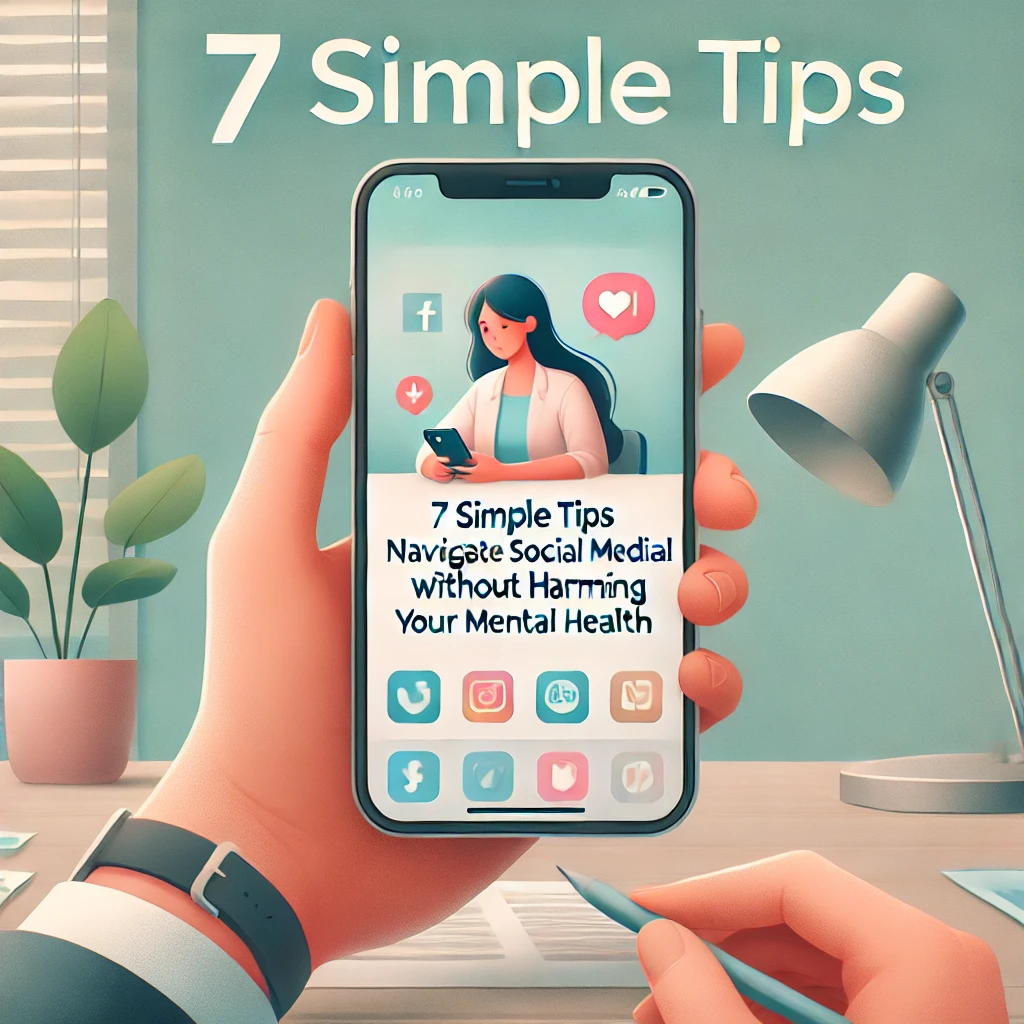Social media can connect us, inspire us, and entertain us—but it can also take a toll on our mental health. The curated feeds, endless scrolling, and constant notifications can amplify anxiety, self-doubt, and stress. Instead of quitting social media, adopt mindful strategies to use it in ways that enhance your life. Here are 7 actionable tips, including insights from Acceptance and Commitment Therapy (ACT), to help you maintain a healthy balance.

The Impact of Social Media on Mental Health
Social media offers connection, education, and inspiration, but it also poses risks. It can create feelings of inadequacy, anxiety, or addiction when not managed properly.
Why Social Media Affects Mental Health:
- Comparison Culture: Seeing others’ highlight reels can make you feel less accomplished.
- FOMO (Fear of Missing Out): Constant updates can make you feel excluded or left behind.
- Information Overload: Endless news cycles and content overwhelm your mind.
- Addictive Behavior: Apps are designed to keep you scrolling, often at the expense of sleep and productivity.
Recognizing these pitfalls is the first step to creating a healthier relationship with social media.
7 Tips to Navigate Social Media Without Harming Your Mental Health
1. Clarify Your Values and Intentions (ACT Tip)
Social media often pulls us away from what truly matters. Reflect on your core values and set an intention for how you want to use it.
Action Step: Ask yourself:
- “Why am I using this platform?”
- “Does my use align with my values (e.g., connection, learning, creativity)?”
By aligning your habits with your values, you can avoid mindless scrolling and focus on purposeful use.
2. Practice Mindful Scrolling
Mindfulness helps you engage with social media consciously instead of reacting automatically.
ACT Technique: Use present-moment awareness. While scrolling, pause and notice:
- Your thoughts (“I’m comparing myself to this post.”)
- Your emotions (“This makes me feel envious.”)
- Your physical sensations (tightness in your chest, tension in your shoulders).
By noticing without judgment, you create space to make intentional choices.
3. Limit Social Media Triggers
Social media algorithms thrive on keeping you hooked, often through emotional reactions. Reduce exposure to content that drains you.
Practical Tips:
- Mute accounts that make you feel inadequate or anxious.
- Follow uplifting or educational pages that align with your interests.
- Use filters or features to hide distressing topics.
4. Set Realistic Time Boundaries
Excessive time on social media often leads to burnout. Create firm limits to prioritize offline activities.
ACT-Based Commitment: Treat your boundary as a promise to yourself. For example:
- “I’ll spend no more than 30 minutes on social media after dinner.”
- Use apps like StayFocusd or built-in screen time tools to reinforce limits.
Bonus Tip: Replace social media time with an activity aligned with your values, like journaling or exercising.
5. Reframe Negative Thoughts
It’s easy to compare yourself to others online. Reframe these thoughts using cognitive defusion, an ACT technique.
Example:
- Thought: “I’ll never be as successful as them.”
- Reframe: “This is just a thought, not a fact. Everyone’s journey is different.”
Practice seeing your thoughts as passing mental events, not ultimate truths.
6. Schedule Social Media Detox Periods
Taking intentional breaks from social media can recharge your mental health.
ACT-Inspired Practice: Use detox periods to engage in value-driven activities. For example:
- Spend time with loved ones.
- Explore nature.
- Practice a creative hobby.
Detoxing doesn’t mean you’re “failing” to keep up—it’s an act of self-care.
7. Focus on Connection, Not Validation
Social media often encourages us to seek likes and validation. Shift your focus to meaningful interactions instead.
ACT Strategy: Ask yourself:
- “Am I using this post to connect or to get validation?”
- “How can I make my online interactions more genuine and fulfilling?”
Engage in conversations, share authentically, and support others to foster deeper connections.
FAQs
1. How can I stop comparing myself to others online?
Practice mindfulness to notice comparison without judgment. Remind yourself that social media shows highlights, not reality.
2. How often should I detox from social media?
There’s no perfect schedule, but regular breaks—even a few hours—can reset your perspective.
3. Can social media ever benefit mental health?
Yes! When used intentionally, social media can connect you to support groups, educational content, and inspiring communities.
4. How do I know if social media is harming my mental health?
Signs include anxiety after scrolling, neglecting offline priorities, and comparing yourself negatively to others.
5. What’s an easy way to start using social media mindfully?
Set a timer before logging in and identify your purpose for using it (e.g., connecting with a friend or learning something new).
6. Can ACT techniques really help with social media habits?
Absolutely! ACT emphasizes mindfulness, values-based actions, and cognitive defusion, which are perfect for managing online behaviors.
Takeaway
Social media doesn’t have to harm your mental health. By applying these practical tips and ACT strategies, you can enjoy social media as a tool for connection and growth—without letting it take over your life.
For more insights on the effects of social media, check out this research on digital well-being.
For more on mindfulness and mental health, visit Mindful.org.
Finding Support in Houston, Texas
If you’re in the Houston, Texas area and seeking mental health support, Luna and Sol Counseling PLLC can help. We offer personalized therapy plans, parent training, and resources tailored to address a range of challenges, including ADHD, anxiety, trauma, and depression.
Let us guide you toward healthier habits and meaningful connections, both online and offline. Visit Luna and Sol Counseling PLLC to learn more about our specialized services and schedule an appointment today.
